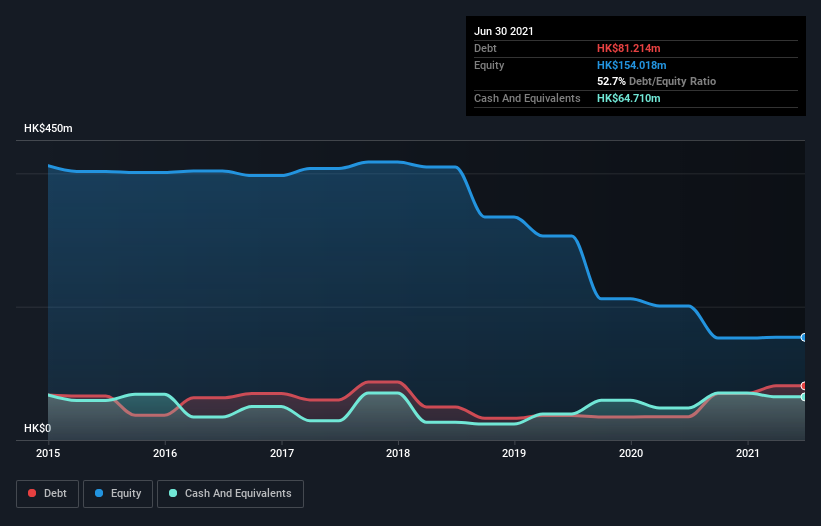Some say volatility, rather than debt, is the best way to think about risk as an investor, but Warren Buffett famously said that 'Volatility is far from synonymous with risk.' It's only natural to consider a company's balance sheet when you examine how risky it is, since debt is often involved when a business collapses. Importantly, Hing Lee (HK) Holdings Limited (HKG:396) does carry debt. But is this debt a concern to shareholders?
When Is Debt Dangerous?
Debt is a tool to help businesses grow, but if a business is incapable of paying off its lenders, then it exists at their mercy. Ultimately, if the company can't fulfill its legal obligations to repay debt, shareholders could walk away with nothing. However, a more frequent (but still costly) occurrence is where a company must issue shares at bargain-basement prices, permanently diluting shareholders, just to shore up its balance sheet. Of course, the upside of debt is that it often represents cheap capital, especially when it replaces dilution in a company with the ability to reinvest at high rates of return. When we think about a company's use of debt, we first look at cash and debt together.
Check out our latest analysis for Hing Lee (HK) Holdings
How Much Debt Does Hing Lee (HK) Holdings Carry?
As you can see below, at the end of June 2021, Hing Lee (HK) Holdings had HK$81.2m of debt, up from HK$35.0m a year ago. Click the image for more detail. On the flip side, it has HK$64.7m in cash leading to net debt of about HK$16.5m.

How Healthy Is Hing Lee (HK) Holdings' Balance Sheet?
We can see from the most recent balance sheet that Hing Lee (HK) Holdings had liabilities of HK$146.5m falling due within a year, and liabilities of HK$11.0m due beyond that. Offsetting this, it had HK$64.7m in cash and HK$36.6m in receivables that were due within 12 months. So its liabilities outweigh the sum of its cash and (near-term) receivables by HK$56.1m.
This deficit isn't so bad because Hing Lee (HK) Holdings is worth HK$130.9m, and thus could probably raise enough capital to shore up its balance sheet, if the need arose. But it's clear that we should definitely closely examine whether it can manage its debt without dilution. The balance sheet is clearly the area to focus on when you are analysing debt. But it is Hing Lee (HK) Holdings's earnings that will influence how the balance sheet holds up in the future. So if you're keen to discover more about its earnings, it might be worth checking out this graph of its long term earnings trend.
Over 12 months, Hing Lee (HK) Holdings made a loss at the EBIT level, and saw its revenue drop to HK$204m, which is a fall of 22%. That makes us nervous, to say the least.
Caveat Emptor
Not only did Hing Lee (HK) Holdings's revenue slip over the last twelve months, but it also produced negative earnings before interest and tax (EBIT). Indeed, it lost a very considerable HK$45m at the EBIT level. Considering that alongside the liabilities mentioned above does not give us much confidence that company should be using so much debt. So we think its balance sheet is a little strained, though not beyond repair. Another cause for caution is that is bled HK$28m in negative free cash flow over the last twelve months. So in short it's a really risky stock. When analysing debt levels, the balance sheet is the obvious place to start. However, not all investment risk resides within the balance sheet - far from it. For example, we've discovered 3 warning signs for Hing Lee (HK) Holdings (1 can't be ignored!) that you should be aware of before investing here.
At the end of the day, it's often better to focus on companies that are free from net debt. You can access our special list of such companies (all with a track record of profit growth). It's free.
Valuation is complex, but we're here to simplify it.
Discover if Hing Lee (HK) Holdings might be undervalued or overvalued with our detailed analysis, featuring fair value estimates, potential risks, dividends, insider trades, and its financial condition.
Access Free AnalysisHave feedback on this article? Concerned about the content? Get in touch with us directly. Alternatively, email editorial-team (at) simplywallst.com.
This article by Simply Wall St is general in nature. We provide commentary based on historical data and analyst forecasts only using an unbiased methodology and our articles are not intended to be financial advice. It does not constitute a recommendation to buy or sell any stock, and does not take account of your objectives, or your financial situation. We aim to bring you long-term focused analysis driven by fundamental data. Note that our analysis may not factor in the latest price-sensitive company announcements or qualitative material. Simply Wall St has no position in any stocks mentioned.
About SEHK:396
Hing Lee (HK) Holdings
An investment holding company, engages in the design, manufacture, marketing, sale, and export of home furniture products in the People's Republic of China, rest of Asia, Europe, and the United States.
Flawless balance sheet average dividend payer.
Market Insights
Community Narratives



